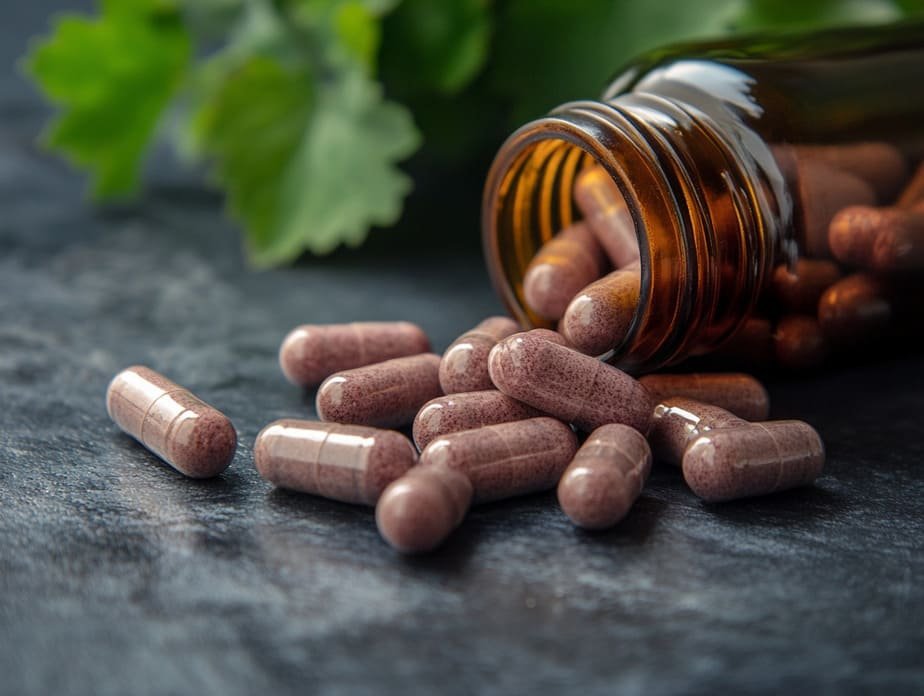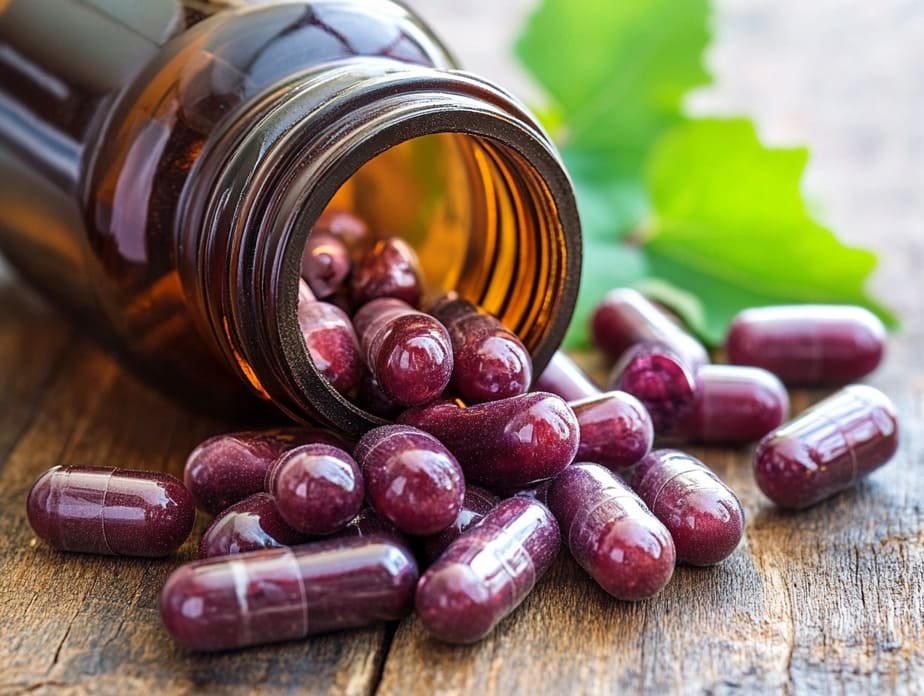Resveratrol, a powerful antioxidant found in foods like red grapes, berries, and even peanuts, is becoming more and more mainstream as people seek natural supplements to enhance their health and well-being.
Initially popularized for its role in the “French Paradox” (the concept that despite a diet high in saturated fats, the French population has a relatively low incidence of heart disease, attributed to their consumption of red wine), Resveratrol has now gained recognition for a wide variety of potential health benefits.
What Is Resveratrol All About?
Resveratrol is a polyphenolic compound primarily known for its antioxidant properties. Antioxidants help neutralize harmful free radicals in the body, which can otherwise lead to oxidative stress and the development of chronic diseases such as heart disease, diabetes, and cancer.
Due to its wide range of benefits, Resveratrol is now widely consumed as a dietary supplement, either in pill form or through increased intake of red wine or foods that contain it.
So, why do so many people take and endorse Resveratrol? The answer lies in its extensive list of benefits—ranging from cardiovascular health to anti-aging properties. As more research emerges, Resveratrol continues to be embraced by those seeking to improve their overall health.
Stay Informed About Your Health
If you're interested in taking your health to the next level through better habits, nutrition, and supplementation, sign up for our newsletter. Get exclusive information on the latest health trends and insights to help you achieve your wellness goals.

Benefits of Resveratrol
Resveratrol offers a broad spectrum of health benefits, supported by both traditional use and scientific research. Here are five key benefits that explain why so many people incorporate Resveratrol into their daily routine.
1. Supports Cardiovascular Health
Resveratrol is best known for its role in promoting heart health. It helps improve the function of blood vessels, reduces inflammation, and prevents the oxidation of LDL cholesterol—one of the major risk factors for heart disease.
Research and Data
A study published in The American Journal of Cardiology found that Resveratrol reduced oxidative stress in blood vessels, improved endothelial function (the function of the inner lining of blood vessels), and lowered inflammation, all of which are important for maintaining heart health.
The researchers concluded that Resveratrol supplementation could help reduce the risk of cardiovascular events.
2. Anti-Aging and Longevity
Resveratrol has been linked to anti-aging benefits due to its ability to activate certain genes associated with longevity. Specifically, Resveratrol activates sirtuins, proteins that protect the body against age-related decline by regulating cellular health and metabolism.
Research and Data
A study in Nature showed that Resveratrol mimics the effects of calorie restriction, which is known to extend lifespan in various organisms. By activating sirtuins, Resveratrol helps cells survive under stress, ultimately contributing to increased lifespan in animal models.
While human studies are ongoing, these findings are promising for longevity research.
3. Improves Cognitive Function
Resveratrol’s neuroprotective properties help support brain health, potentially improving memory and cognitive function. By reducing inflammation and oxidative stress in the brain, Resveratrol may also play a role in lowering the risk of neurodegenerative diseases like Alzheimer's and Parkinson's.
Research and Data
In a study published in Frontiers in Aging Neuroscience, Resveratrol was shown to protect brain cells from oxidative stress, thereby reducing cognitive decline in aging populations.
Participants who took Resveratrol over a 12-month period showed improvements in memory performance and cognitive function.
4. Helps Manage Blood Sugar Levels
Resveratrol has shown potential in helping to regulate blood sugar levels, making it particularly useful for individuals with insulin sensitivity or type 2 diabetes. It enhances insulin sensitivity and improves glucose metabolism, helping to prevent spikes in blood sugar.
Research and Data
A study published in Diabetes Care demonstrated that Resveratrol supplementation improved insulin sensitivity and lowered blood glucose levels in individuals with type 2 diabetes.
The researchers observed that Resveratrol activated certain pathways that help manage glucose metabolism, leading to better blood sugar control.
5. Supports Weight Management
While not a direct fat burner, Resveratrol may help support weight management by boosting metabolism and preventing fat storage. It activates certain enzymes that break down fat stores and prevent the formation of new fat cells.
Research and Data
A study published in Obesity Research & Clinical Practice found that participants who took Resveratrol showed reduced fat accumulation and an increase in fat breakdown.
The researchers noted that Resveratrol promotes thermogenesis (heat production in the body), which contributes to fat loss.

How Long Does It Take Resveratrol to Work?
The effects of Resveratrol can vary based on the individual, the dosage, and the specific health benefits being sought.
For example, cardiovascular benefits may become noticeable within a few weeks to months of consistent use, while cognitive improvements may take longer to manifest.
For individuals seeking improved blood sugar management, noticeable effects could be observed within a few weeks of regular Resveratrol supplementation.
Anti-aging and longevity benefits, however, are long-term and may require years of consistent use to fully appreciate the effects.
What Do These Benefits Amount To?
The combined benefits of Resveratrol can lead to significant improvements in one’s daily life and overall well-being.
Whether you're taking it for heart health, cognitive function, or simply as a preventative measure against aging, Resveratrol helps promote a healthier, more vibrant lifestyle.
Users may experience increased energy, mental clarity, improved metabolic function, and a reduced risk of chronic disease.
Who Is Resveratrol For?
Resveratrol is ideal for a wide range of individuals, particularly:
- Individuals concerned about heart health: Resveratrol is an excellent supplement for those at risk of cardiovascular disease, as it supports healthy blood vessels and lowers cholesterol levels.
- Older adults: Those looking to slow the aging process and protect brain health may benefit from Resveratrol’s anti-aging properties.
- People with type 2 diabetes or insulin resistance: Resveratrol can help manage blood sugar levels and improve insulin sensitivity.
- Athletes and active individuals: Resveratrol may improve endurance and metabolism, making it useful for people who exercise regularly.
Research and Data
A study published in The Journal of Gerontology concluded that Resveratrol supplementation is particularly beneficial for older adults, as it helps reduce age-related inflammation and supports cognitive function.

How Much Resveratrol Should You Take?
The recommended dosage of Resveratrol varies depending on the desired health outcome.
Typical dosages range from 250 mg to 500 mg per day for general health benefits, with higher doses of 500 mg to 1,000 mg being used in studies for specific conditions like type 2 diabetes or cardiovascular health.
It’s important to follow the instructions on the supplement label and consult with a healthcare provider to determine the best dosage for your needs.
What Are the Limitations?
While Resveratrol has a wide range of potential benefits, it's important to recognize that it is not a quick fix or miracle cure.
It takes time to work, and its full benefits may not be seen for weeks or months of consistent use.
Additionally, while many studies show promising results, more large-scale human trials are needed to confirm its efficacy in areas like cancer prevention and lifespan extension.
Warning: It’s Not All the Same
Not all Resveratrol supplements are created equal. When choosing a Resveratrol supplement, it’s important to look for high-quality products that contain pure Resveratrol and are free from unnecessary additives.
What to Look For in a Good Resveratrol Supplement
- High purity and concentration: Look for supplements that contain at least 98% pure Resveratrol.
- Third-party testing: Ensure the product has been independently tested for purity and potency.
- Minimal additives: Choose products that are free from artificial fillers or preservatives.
What to Avoid in a Bad Resveratrol Supplement
- Low purity: Avoid supplements that don’t specify the concentration of Resveratrol or contain low amounts of the active ingredient.
- Unverified claims: Be cautious of products that make exaggerated claims without scientific backing.
- Fillers and additives: Avoid products with unnecessary additives, which can dilute the effectiveness of the Resveratrol.

Best Resveratrol Supplements on the Market
Here are some of the best Resveratrol supplements available today, known for their quality, purity, and effectiveness:
- Reserveage Nutrition Resveratrol: This supplement provides 500 mg of Resveratrol and is made from organic grapes, ensuring a high level of purity and potency.
- Life Extension Optimized Resveratrol: Offering a blend of Resveratrol and other polyphenols, this supplement is designed to enhance the antioxidant effects and improve overall health.
- NOW Foods Natural Resveratrol: This affordable option delivers 200 mg of Resveratrol per serving and is free from artificial additives, making it a good choice for those on a budget.
- Purely Beneficial Resveratrol: This supplement contains a high dose of 1,200 mg per serving, making it ideal for those looking for a more potent option.
Top 20 Frequently Asked Questions About Resveratrol
- Is Resveratrol safe for long-term use?
Yes, Resveratrol is generally considered safe for long-term use when taken at recommended dosages. Research suggests that it has a favorable safety profile, though it's always important to consult with a healthcare provider, especially if you're taking other medications. - Can Resveratrol help with weight loss?
Resveratrol may help support weight loss by enhancing metabolism and preventing fat storage, but it is not a standalone weight-loss supplement. Its effects on weight loss are more subtle and likely to be enhanced when combined with a healthy diet and exercise. - Is Resveratrol safe for pregnant or breastfeeding women?
There isn’t enough research to definitively say whether Resveratrol is safe for pregnant or breastfeeding women. It’s best to consult with a healthcare provider before using it during pregnancy or while breastfeeding. - How much Resveratrol is in red wine?
The amount of Resveratrol in red wine can vary, but on average, a glass of red wine contains about 1-2 mg of Resveratrol. This is significantly lower than the amount found in most Resveratrol supplements, which typically range from 100 mg to 1,000 mg per serving. - What are the potential side effects of Resveratrol?
Resveratrol is well-tolerated by most people, but some may experience mild side effects like stomach upset, diarrhea, or dizziness. Taking high doses may increase the risk of these side effects. - Does Resveratrol interact with medications?
Yes, Resveratrol may interact with certain medications, such as blood thinners (e.g., warfarin) and non-steroidal anti-inflammatory drugs (NSAIDs). Always consult your doctor if you are taking medications and considering Resveratrol supplementation. - Can Resveratrol improve skin health?
Yes, Resveratrol’s antioxidant properties can benefit skin health by protecting against damage from free radicals and reducing the appearance of wrinkles and fine lines. Some skincare products also contain Resveratrol for its anti-aging benefits. - Is Resveratrol suitable for vegans?
Most Resveratrol supplements are plant-based and suitable for vegans, but it's always important to check the label to ensure no animal-derived ingredients are used. - Can Resveratrol prevent cancer?
While Resveratrol has shown potential anti-cancer properties in lab studies, its effectiveness in humans is still under investigation. It may help prevent the development of cancer by neutralizing free radicals, but more research is needed. - How does Resveratrol compare to other antioxidants?
Resveratrol is a potent antioxidant, but it's not the only one. Others, like vitamin C, vitamin E, and flavonoids, offer their own unique benefits. Resveratrol is particularly noted for its potential in promoting heart health and longevity. - Can I take Resveratrol with other supplements?
Yes, Resveratrol can generally be taken with other supplements, but it's important to consult with a healthcare provider to ensure there are no potential interactions. - Is Resveratrol beneficial for athletes?
Resveratrol may improve endurance and recovery by supporting cardiovascular health and reducing inflammation. Some athletes take Resveratrol to boost stamina and reduce muscle fatigue. - How should I store Resveratrol supplements?
Resveratrol supplements should be stored in a cool, dry place away from direct sunlight to maintain their potency. - Is Resveratrol safe for children?
There is limited research on the effects of Resveratrol in children, so it’s best to avoid giving it to children unless recommended by a healthcare provider. - Can Resveratrol help with diabetes?
Yes, Resveratrol has shown promise in improving insulin sensitivity and regulating blood sugar levels, making it beneficial for individuals with type 2 diabetes. - Does Resveratrol increase energy levels?
While Resveratrol is not a direct energy booster like caffeine, it may increase energy over time by improving metabolic function and reducing fatigue. - How does Resveratrol support brain health?
Resveratrol protects brain cells from oxidative stress and inflammation, both of which are key factors in age-related cognitive decline. - Can I get enough Resveratrol from food?
While foods like red grapes, blueberries, and peanuts contain Resveratrol, the amounts are relatively small compared to what’s found in supplements. Supplementation is often recommended for those seeking higher doses of the compound. - Is Resveratrol good for hair health?
Some research suggests that Resveratrol’s antioxidant properties may support hair health by reducing oxidative stress, though more studies are needed to confirm this effect. - How long should I take Resveratrol to see results?
The timeline for seeing results with Resveratrol varies depending on the specific benefits you're seeking. For cardiovascular health and blood sugar regulation, you may see improvements in a few weeks, while cognitive or anti-aging effects may take longer.
Final Thoughts on Resveratrol and Long-Term Health
Building a healthy body is a long-term endeavor that requires consistent effort, time, and smart choices.
Resveratrol is a valuable supplement that can support your health journey by promoting cardiovascular wellness, protecting cognitive function, and fighting oxidative stress.
However, like any supplement, it works best when combined with a healthy lifestyle that includes a balanced diet and regular exercise.
If you're looking for guidance on your wellness journey, sign up for our newsletter! We'll provide you with expert advice, tips, and the latest research to help you stay on track toward achieving your health and fitness goals.

